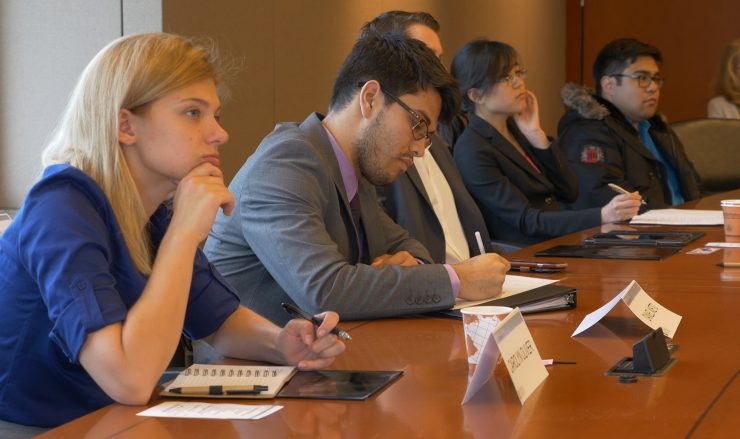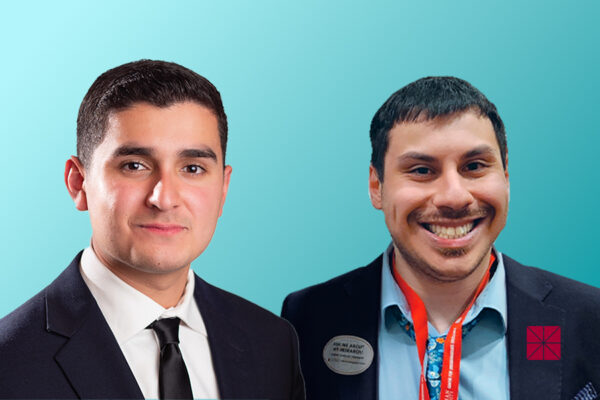This might seem goofy, says Alyssa Soto (MBA ’03). But if you want to build a savings, you’re going to have to plan it into your life, and this technique works, she tells a group of Chapman University students gathered on a Thursday evening in a meeting room for a seminar on financial literacy.
First, write down three goals – short, medium and long-term – on a piece of paper. Don’t skip this step because you have to be all in for this tactic to work.

Students listen and take notes at a LEAD workshop dedicated to understanding the investing and savings plans that many employers offer in benefits packages.
The short-term goal can be as simple as saving up for a visit to the Wizarding World of Harry Potter. The long-term goal might be a new car purchase. Maybe that middle goal is chipping away credit card debt. Oh, but wait, surely not that, adds Soto, a vice president at PIMCO, a global investment management firm.
“We’re paying those credit card bills off every month, right?” she asks with a sly smile.
A wave of chuckles ripples across the room.
OK, so no one said financial mastery would happen in a day. But thanks to a new program piloted this spring at Chapman, students are getting more than a day to learn the nuts and bolts of money management before they head out into the world. The Financial Literacy, Education, Awareness, and Discipline (LEAD) Program is a free six-week workshop sponsored by Chapman Student Life, the Career Development Center and Alumni Career & Industry.
LEAD’s goal is to help students handle those myriad financial decisions of young adulthood, from understanding that first benefits package to deciphering the fine print on a car loan. The plan is to offer the program every semester beginning in the fall.
Such financial literacy lessons have never been more important, says Chapman University Trustee Akin Ceylan ’90, who joins Jerry Price, dean of students, and Fadel Lawandy, director of Chapman’s Hoag Center for Real Estate and Finance, on the team behind the program’s curriculum.
First job? A couple money tips
Some well-made decisions early on can save bundles down the road. Mike Giangrande ’02 (LLM ’08) is a tax accountant and tax attorney who taught the LEAD session on total compensation packages. His top tips for new worker bees:
- Put as much as you can into IRAs, 401(k)s, etc., and not just the amount that will get your firm’s matching. It’s better to get used to the smaller take-home paycheck now and continue driving the crappy used car, because it is very hard to lower your standard of living later to catch up on retirement saving.
- Many employers have no interest in promoting you. Part of their business model is to continuously hire new graduates at low pay (even though they will all tell you otherwise). As long as you understand this and accept it, then it will be easier for you to not get angry about the low pay and lack of benefits. Use them for experience and to make connections just as they are using you for cheap labor, and then move on.
“Our world’s going to get more complex. Students today are not going to have the reliability of a pension. They’re going to have eight to 10, to 12, 15 jobs throughout their lifetime. So with that, they have to take financial leadership of their lives and figure that out. They have to be adaptable,” says Ceylan, the COO of home entertainment and global content delivery for Lionsgate.
The workshops were taught this spring by a roster of alumni who are all leaders in the fields of finance, financial planning, insurance, benefits consulting and law. In addition, Ceylan attended the sessions, lending students his insights to the business and corporate life many will soon join. Students say that kind of expertise has been invaluable.
“This information is going to last far beyond our student years,” said Kyle Herron ’17, a strategic and corporate communications major. Although still a student, he says the course has helped him think ahead to that first full-time paycheck and how he can use it well. “This is going to be significantly useful information over a 10- to 20-year span.”
And there are immediate benefits, too. Think grandma-style budgeting but with a technology tool in hand. Communications studies major Kristina Lamb ’16 says she learned how to use an expense-tracking app that revealed how indulgent spending here and there over the course of a month added up to a serious chunk of change. Now she sticks to a budget and her savings is growing. Even better, the credit card debt she accrued to pay for community college before she transferred to Chapman is shrinking.
The opportunity to meet alumni while still an undergraduate has been powerful, too, she says.
“It all the more solidifies why I’ve come here to Chapman,” Lamb says.
The alumni who volunteered their time to teach the classes, many of whom are also members of the leadership group Chapman50, say the pleasure has truly been all theirs.
Justin Klein ’05, executive vice president at KPP Financial and co-host of the podcast
InvestTalk, hopes an early understanding of financial pitfalls will save students a stumble or two later on. Klein spoke on a variety of topics over the course of two Thursdays when he and Soto taught, from the distinctions between 401Ks and Roth IRAs to the best investment columnist to follow.
But he especially enjoys sounding the warning against letting your emotions run away with your money.
“I love talking about the emotional aspect of money decisions because money is emotional,” Klein says. If you’re at a cocktail party and everyone is talking about the hot new investment, stock or fund, it may sound exciting but take heed, he says. “You’re probably too late. You’re better off focusing on fundamentals … Exciting ideas tend to be dangerous.”
Soto counts financial literacy as one of young adulthood’s biggest lessons, and says she feels called to share her knowledge.
“Not only is this my passion in terms of an industry, but Chapman is a passion of mine and giving back to the University in this way is something that is at the core of who I am. And as a member of Chapman50 one of our missions is to be able to mentor others,” she says. “Hopefully, exposing our students here at Chapman to the reality of the world gives them some knowledge and skills as they move through the next decade.”
LEAD instructors this spring included Pat Boulard, ’90 (MBA ’92), Jason Burris ’02, (JD ’08), Mike Giangrande ’02 (LLM ’08), Justin Klein, B.S. ’05, Sam Lahham (MBA ’13), Julie Mangrello-Jennings (M.S. ’07), Rob Selway ’07, (MBA ’10), Vasily Shorokhov ’01, (MBA ’12) and Alyssa Soto (MBA ’03). To learn more about the fall program, contact the Career Development Center at (714) 997-6942 or visit the center’s website.





Add comment